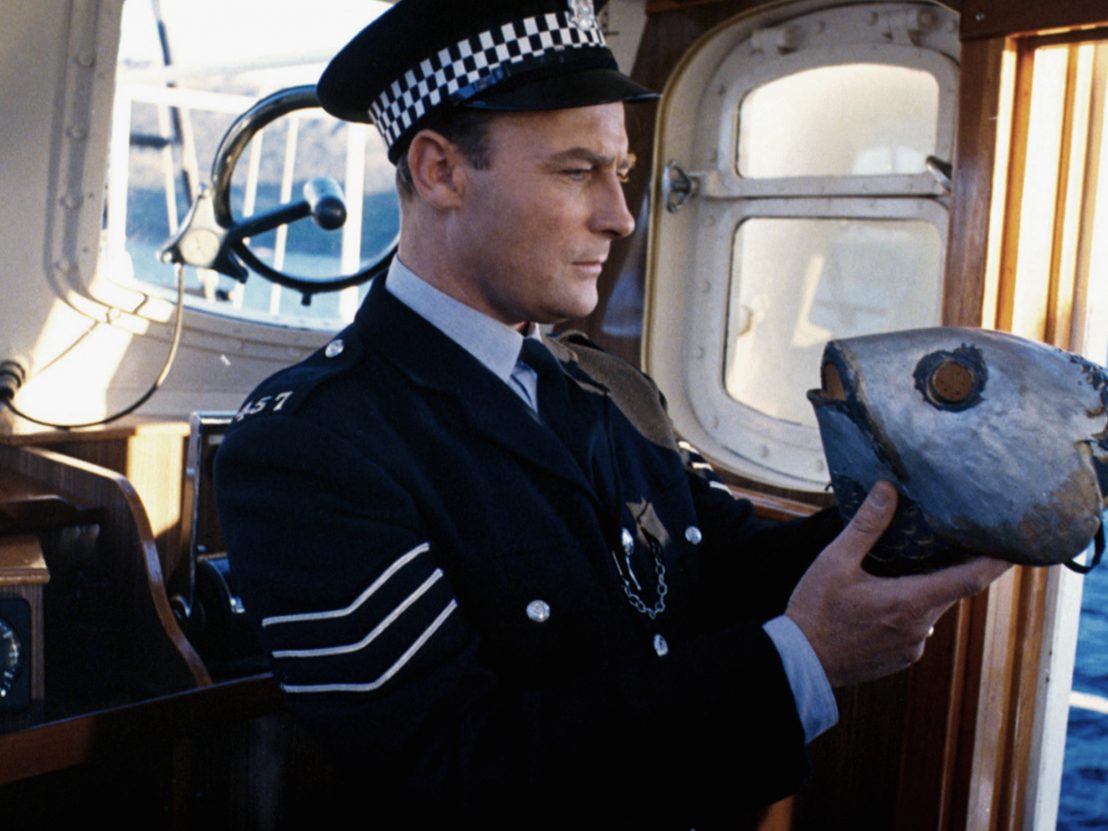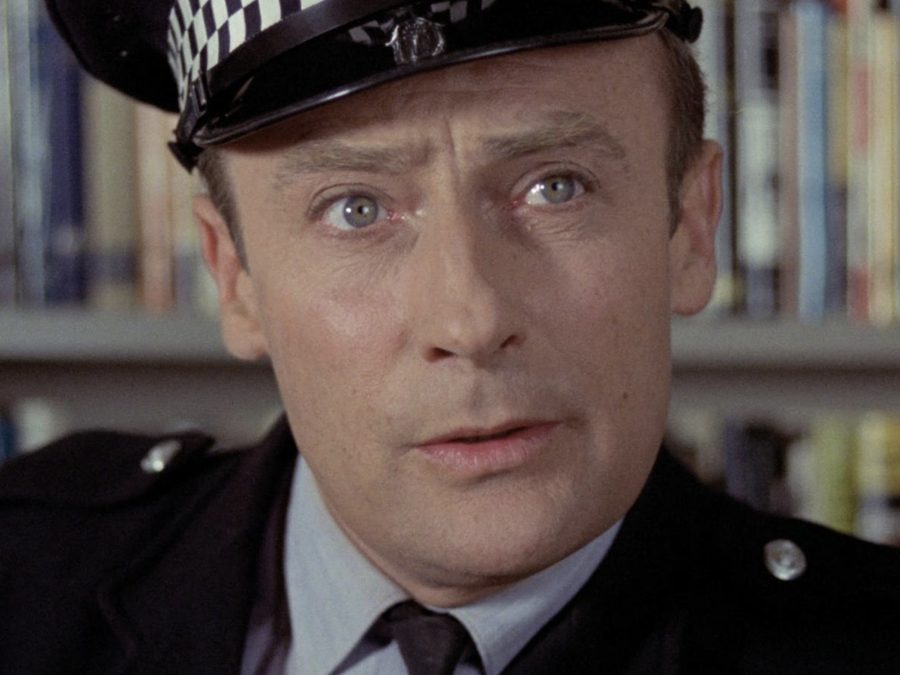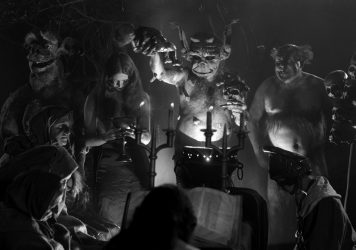
Robin Hardy’s 1973 folk horror flick The Wicker Man has become legendary for many things: its unbearable building of tension, fearlessly strange content, eerie soundtrack, and petrifying conclusion. It also challenged a preconceived notion that true horror only exists in the dark of night – practically everything happens under bright, unwavering sunlight. Daylight horror has lived on ever since, from 28 Days Later to newer additions to the horror canon like Midsommar. While there are many reasons The Wicker Man has endured for the last 50 years, the extraordinary performance of Edward Woodward as Sergeant Neil Howie stands above the rest.
We first see Howie in a seaplane, on his way from the mainland to the remote Scottish island of Summerisle. This journey over the picturesque island would be an opportunity to relax for most, but Howie’s eyes are pointed straight ahead, with the stern gaze of a man on a mission. That’s true in a literal sense – Howie is coming to Summerisle to follow up on reports of a missing child – but from the jump, it’s clear this is a man steadfast in his profession. This trip to Summerisle is no vacation; Howie intends to get in, find the girl, and get out.
In theory, Sergeant Howie’s mission shouldn’t be too challenging. Places like Summerisle are tight-knit communities – the kind where everybody not only knows each other, but knows what everyone is up to. Yet nobody recognises the photo of young Rowan Morrison (Geraldine Cowper). Even so, Howie is a man with no time for nonsense, and his rigid posture, which always remains perfectly straight, marks him as a man of considerable intensity. He exudes power in his committed strides as he makes his way through an island that does not want him there.
The Wicker Man is the ultimate test of belief for Howie. Everything in Summerisle feels purpose-built to get a rise out of the Sergeant and torment his deeply Christian sensibilities. From teaching children about sex, to actively encouraging sexual impropriety, everything done in Summerisle runs counter to Howie’s beliefs. He lives a devout Christian life, determined to fight every urge and impulse. To see everything he puts at bay flagrantly out in the open forces Howie to grapple with the faith that drives him.
Belief is paramount to Sergeant Howie, and his walk through Summerisle’s Pagan cemetery brings out the majesty of Woodward’s physical subtleties. This is a man so devoted to Christ that he simply cannot walk through the cemetery without doing something, anything, to bring in his Lord’s presence. Finding a pile of sticks, he rests his hat gently on the tomb, before aggressively reshaping the sticks into a cross. Taking a step back, he absorbs the now Christly image in, looking solemn, offering the only resistance he can muster. It’s his one chance to bring any semblance of hope and faith to this cursed island, and he takes it.
Woodward’s roots were in the theatre, a medium where subtle facial expressions aren’t seen by the majority of the audience, and one’s voice must carry most of the emotions. But Woodward wisely makes the most of Hardy’s frequent close-ups, highlighting Howie’s increasing fears, not through screeches and howls but through a furrowing of the brow or a glint of terror in his eyes. He tells Rowan’s mother that everyone on the island is “raving mad”, not with a sense of fury, but a pithy resignation.

Howie is used to being feared, but nobody in Summerisle seems to do so much as blink when he tries to impose his will on them. This comes to a head when he finally meets Lord Summerisle (an unforgettable Christopher Lee), the community’s landholder and ruler. He isn’t remotely phased by Howie’s attempts at aggression, much less his virulent attack on Summerisle’s Pagan faith. Voice cracking, Howie pleads with Summerisle: “Sir, have these children never heard of Jesus?” The line is loaded with genuine distress; a man who cannot understand any way of life that isn’t his own. It’s a scene that could render Howie unsympathetic and ignorant, but Woodward performs with such raw concern that it’s easy to imagine yourself in his shoes, and how frightening it would feel if everyone was united against your beliefs. When he sits, as ordered by Summerisle, it’s the first time Howie looks powerless, completely dwarfed by Summerisle’s towering presence. For the first time it’s clear Howie is completely overwhelmed.
As May Day arrives on the island, Howie has become desperate to find Rowan. To blend in, he wears a Punch costume for much of the festival. The costume does away with Howie’s perfect posture, and in donning a ridiculous outfit with a bulbous hump on the back, he’s literally become the fool the islanders have destined him to be. Soon the truth is revealed: Rowan was never in danger. She was merely a means to lure Howie to Summerisle of his own free will, so he could be the one sacrificed to ensure a bountiful harvest. Howie is devastated, and the look in his eyes when he glances up to see the entire island’s populace staring down at him, weapons in hand, is the look of a truly lost man: one who knows he’s about to die. His bright blue eyes, once hopeful, are now awash in anguish.
Yet even faced with the inevitability of being set ablaze in the giant Wicker Man, Howie’s faith does not waver. “It is I who will live again”, Howie yells, delivered with an imposing force: he absolutely believes this. As the women prepare him for sacrifice, Howie first looks disgusted. But when they rub their hair over his face, he appears orgasmic, savouring any chance of sensuality he can get before he perishes as a virgin. He savours the women’s touch as much as he despises it, as if pleading with himself to maintain his faith at the most trying time.
Woodward’s voice finally crumbles as Howie begs for his life, yet his body remains rigid and upright, even when faced with no hope of survival. As the residents of Summerisle sing joyously around the burning figure, Howie retains his godly composure, singing Psalm 23 as he burns. It’s a terrifying moment rife with pathos: throughout The Wicker Man, Woodward’s performance has allowed us to connect deeply with Howie’s impossible circumstances, and his defeat feels overwhelming.
This remarkable work is Woodward’s finest on-screen performance: employing physicality and vulnerability, Sergeant Howie is elevated from what could have been a one-note policeman to a compelling man fighting for justice in a place that opposes the very fibre of his being. Woodward brings a powerhouse, almost Shakespearean element to Howie, channelling deep-seated emotional and religious moral quandaries that give his character a clear throughline. His performance acts as a surrogate for the audience, which makes The Wicker Man all the more horrifying – despite desperately trying to do the right thing, his task ends in fiery failure.
The Wicker Man returns to UK cinemas for special 50th anniversary screenings on June 21 2023.
Published 14 Jun 2023

The actor, writer and comedian revisits the Swedish cult oddity ahead of a rare festival screening.

Florence Pugh runs afoul of a Swedish cult in director Ari Aster’s toothless follow-up to Hereditary.

By Paul Weedon
The British musician discusses collaborating with director Ari Aster on his haunting folk horror.